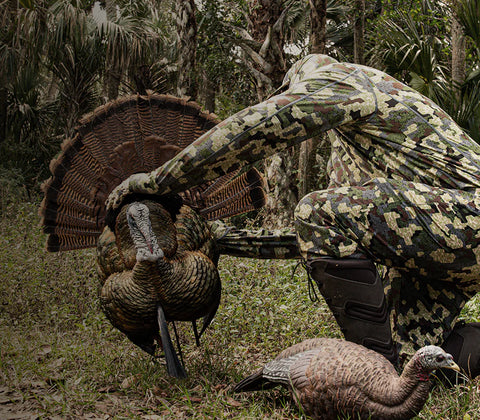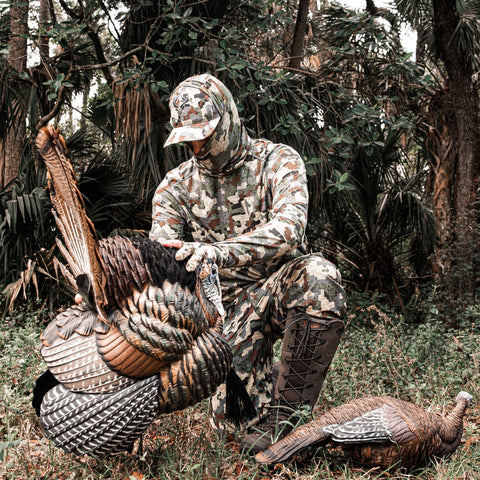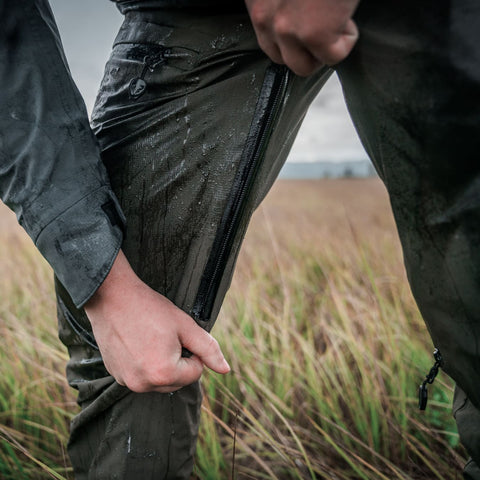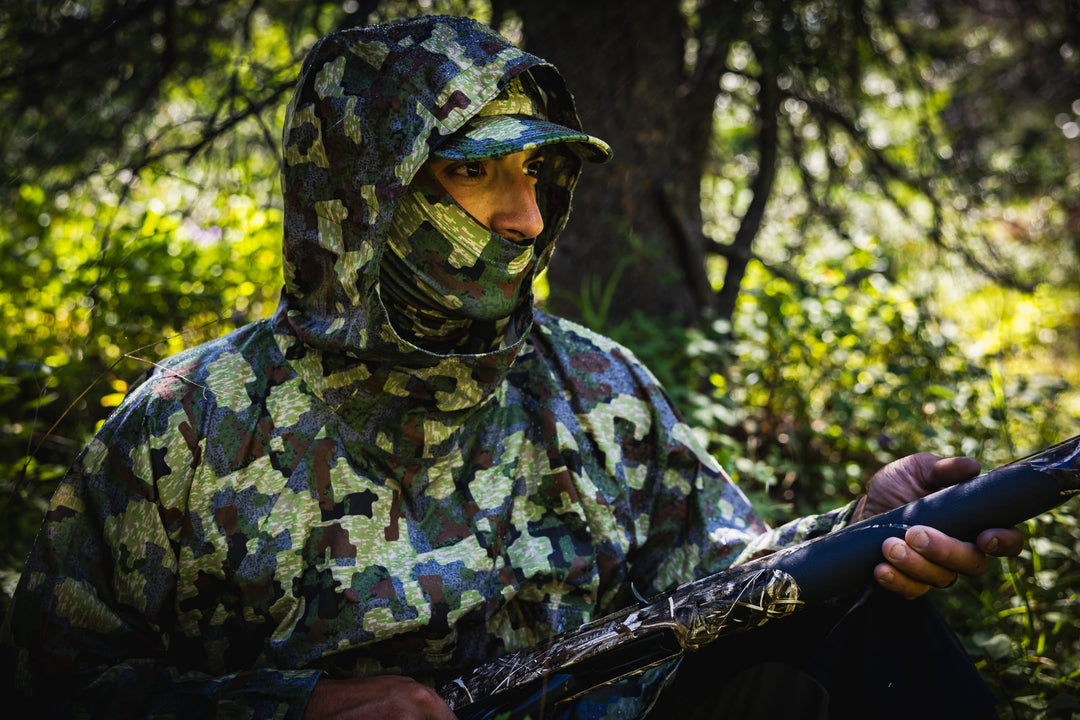Turkey hunting in the rain is almost unavoidable in many regions. If you wait for good weather to hunt during spring turkey season, which runs from April through May, you might not end up hunting at all. Rainy weather may not seem like the best hunting conditions, but it offers several benefits for turkey hunters. Turkeys will stay right out in the open, and rain muffles sound on the forest floor and hides movement.
Spring days with intermittent rain or light drizzle all day offer the perfect opportunity for hunting turkeys. Here’s how to fill your tag with gobblers in the rain.
|
Table of Contents |
Hunt Open Spaces
When it’s raining, turkeys like to hang out in open areas. Their feathers are waterproof, and open fields give them a better view of approaching predators. But turkeys still want to protect their feathers and stay warm, and staying in fields helps them avoid traveling through wet vegetation.
The rain makes it difficult for them to hear, so they move to open areas and rely on their eyes. Soaked fields also offer opportunities for turkeys to find prey like worms.
Rely On Your Eyes
Turkeys often stay quiet during loud, rainy weather, so hunters have to rely on their eyes instead of their ears. Additionally, if you huddle in some brush, falling rain will move the foliage, camouflaging you in the eyes of turkeys. Turkeys also gather on the edges of open fields, so the brush is a great place to stalk.

A good pair of binoculars is an essential piece of turkey hunting gear, especially in the rain. Cover your hunting ground slowly and methodically using a spot and stalk approach, and get ready to move in when the weather clears.
Because of the noise, you should use friction calls rather than mouth calls. Turkeys can hear a friction call at a much greater distance.
Pay Attention To Breaks In The Rain
During sporadic breaks in the rain when the sun briefly pops out, turkeys will quickly begin gobbling, fighting, and breeding. These are ideal situations for using calls. When the rain is about to return and the birds quiet, move in quickly with a hen call. Often, the toms will still be interested.
Don’t rely on a standard weather app and assume it’ll rain all day. Use an app that offers up-to-the-minute dopplers to schedule your entrance into the woods at the same time the rain will stop.

Wear Waterproof Rain Gear
Spring weather can change quickly, so be prepared with multiple layers of clothing and a breathable, packable rain jacket. To combat the rain and humidity, wear a pair of lightweight waterproof pants. This will make a huge difference when sitting and crawling in wet vegetation for long periods of time.
In addition to being packable, breathable, and lightweight, your base layers should be scent-controlling and moisture-wicking, and your outer layers should be waterproof, durable, and insect-resistant.

FORLOH’s AllClima 3L Rain Jacket is waterproof, windproof, and breathable, featuring Airadigm™ Pulse Plasma technology. Every fiber of the jacket is coated with a water-repellent treatment, but it still has a breathable membrane to reduce noise, keep you dry, and prevent excess odor from sweat. The AllClima 3L Rain Pants offer the same benefits, along with full zips from waist to ankle so you can put them on or take them off without removing your boots.
To protect yourself from pesky mosquitoes and other insects during spring hunting season, opt for the Insect Shield® SolAir Hooded Long Sleeve Shirt. This base layer promotes hyper-wicking so it will dry in minutes if it gets wet, and its Polygiene® Stay Fresh antimicrobial and Odor Crunch® scent control systems keep you fresh and undetectable to prey. If you wear it on a warmer day, the brrr® Pro cooling technology will keep you several degrees cooler, and the shirt’s 50+ UPF rating will protect you from the sun.

On a cooler day, maximize your warmth and scent control with the Deep Space Neck Gaiter, which diffuses moisture so you can stay dry and comfortable. Check out more of FORLOH’s turkey hunting gear for any weather conditions.
Use The Rain To Your Advantage
When it’s raining, turkeys can’t hear you as well as they can on clear days, so you can move in closer to them during your hunt. You can also scout on rainy days, learning their routine to prepare for your next hunt. And breaks in the rain are the ideal windows to move in and attack. As the temperature starts to rise, start moving, even if it’s raining.
You don't have to schedule early morning hunts on rainy days, either. In wet weather, turkeys leave the roost later than usual. If rain ends before the sun sets, turkeys may stay in the fields and feed longer than usual.
With countless toms waiting for you in wide open fields, a dreary, rainy day might just be the perfect one to go turkey hunting.

FAQ
Don't be fooled by tricky tom behavior! Here are some common questions and answers about turkey hunting in the rain.
Do Turkeys Move in the Rain?
Yes! Although it may seem counterintuitive, turkeys move in the rain. Rainy or foggy weather inhibits a turkey’s ability to see and hear predators, so it will move into an open area to get a better view of its surroundings. Staying in open areas also helps turkeys avoid getting their feathers wet when moving through the forest.
Is Turkey Hunting Good in the Rain?
Turkey hunting in the rain might actually be better than turkey hunting in clear weather. Turkeys flock to open spaces in the rain to get better visibility and take advantage of easy feeding. As a hunter, you can get closer to your prey and gain valuable knowledge about a turkey’s daily routine.







